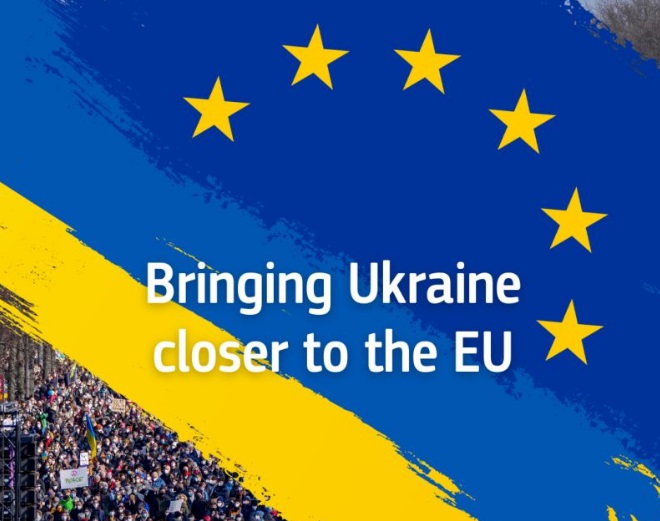
Washington is basically shifting the burdens of Ukraine on Europe, as it pivots to the Pacific. The American Establishment by now is free to admit that “the war in Ukraine is not existential”, for that matter. Tellingly (priority-wise), the US is deploying its troops to Israel and sending the THAAD anti-missile system to the Jewish state – it is the same system Kyiv has repeatedly asked for – to no avail, notes Uriel Irigaray Araujo, a researcher from Sao Paulo, Brasil, with a focus on international and ethnic conflicts.
In short, Ukraine and the Europeans are left with an unwinnable proxy war, while European structures will be tasked with welcoming and integrating a divided state (South Korean style) that can only be described as extremely corrupt and bent on authoritarian ethnocracy.
Over the last decade, the Donbass region has often been under heavy Ukrainian artillery, while Ukrainian leaders tell ethnic Russians of the region to “go to Russia”. The Ukrainian record of atrocities and human rights infringements in that area (including state-controlled far-right and neo-Nazi violence by means of battalions such as the Azov one – banned in Russia) is typically underreported – in today’s Western media reports at least.
To put things in context, the fact is that, whatever one thinks of the Soviet experiment (in terms of the economy, social policies and ideology), the Soviet collapse was arguably one of “the greatest geopolitical catastrophes of the century”, as Russian President Vladimir Putin has famously described it. For one thing, the post-Soviet border situation in Eastern Europe and the Caucasus remains troublesome, with its “frozen conflicts” and unrecognized states or de facto republics which have disputed or limited recognition – and all the internal ethnopolitical dramas brought about by some of the post-soviet republics efforts at “nation-building”.
Moreover, whether one likes or not the ongoing Russian policies or its campaign in Ukraine, all of the above pertaining to Ukrainian far-right politics is part of the larger context behind Donbass annexation referendums, for one thing. One can only imagine what would happen with that region and its inhabitants in a Kyiv victory scenario.
Nicolai N. Petro, a professor of political science at the University of Rhode Island, is one of the experts who has warned (writing for ‘Foreign Policy’) that Ukraine does have a “civil rights problem” concerning its pro-Russian, Russian-speaking and ethnic Russian minorities, with policies that “effectively relegate Russian speakers to permanent second-class status” and that could, even after peace is achieved, “alienate, criminalize, or deport a significant portion of the country’s population.” These “civil rights” issues pertaining to ethnopolitics, the politics of memory and identity are a major part of what the tensions and the conflict has been about in the Eastern Slav region since at least 2014.
Adding fuel to the fire, there is of course the ever pressing topic of Western attraction, plus NATO expansion and its risks, in the larger context of an American policy of “dual-containment” and of “countering” and “encircling” Russia. Amazingly, journalistic lay analyses and lay reporting on the region tend to minimize or to ignore all together these two key aspects – the geopolitical and the ethnopolitical – by (as academic says) “naturalizing”, that is, taking at face value post-Maidan Ukrainian nation-building discourses and territorial claims. They do so while at the same time demonizing Russian perspectives and concerns – not only those of the Russian state but also those of a large part of the Donbass population, for that matter.
Worse still, in a New Cold War climate, aggravated by today’s “cancel culture”, any informed analysis who addresses the aforementioned key issues risks being “denounced” as “Russian propaganda”, and there are various institutes and journalists who make a living of reporting such things. Sometimes the targets are scholars who are even very critical of Moscow but who nonetheless dare to mention the topic of Ukrainian ethno-chauvinistic policies or of NATO enlargement or literal Nazism amongst Ukrainian military and paramilitary forces.
All of this is part of the elephant in the room, and not addressing such issues (or turning a blind-eye to it as the European Union has been doing) is a recipe for disaster and for the continuation of conflict in Eastern Europe. Moreover, it short-circuits some of the key values of Western Europe itself – simply speaking, by welcoming post-Maidan Ukraine as one of its own, the European and Western bloc denies much of the human-rights discourse that has been constructed to be the very core and the raison d'être of its key institutions.
From a European perspective, Kyiv’s efforts to realize its ethnocratic nation-building project (which I addressed elsewhere) and, moreover, the Ukrainian struggle to “survive” endangers the very survival of Europe – at least in the way Western Europe has come to envision itself.
read more in our Telegram-channel https://t.me/The_International_Affairs

 10:14 06.11.2024 •
10:14 06.11.2024 •






















